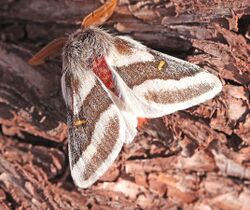Biology:Tricolor buckmoth
| Tricolor buckmoth | |
|---|---|

| |
| Scientific classification | |
| Domain: | Eukaryota |
| Kingdom: | Animalia |
| Phylum: | Arthropoda |
| Class: | Insecta |
| Order: | Lepidoptera |
| Family: | Saturniidae |
| Genus: | Hemileuca |
| Species: | H. tricolor
|
| Binomial name | |
| Hemileuca tricolor (Packard, 1872)
| |
Hemileuca tricolor, the tricolor buckmoth, is a moth in the silkworm family Saturniidae. It is native mainly to the Sonoran Desert of the southwestern United States, including southern Arizona, southwestern New Mexico, and Mexico.[1][2]
Adult description
This species is sexually dimorphic, and the males are smaller and lighter in color than the females. Wingspan is between 2 1⁄8 and 3 1⁄8 inches (5.2 - 7.8 cm). The forewing is gray with a marginal, median, and postmedian white band, and a central yellow or orange eyespot. The hindwing in males is white and in females white to dull brown. The abdomen is red to reddish brown.
Food and host plants
Larval host plants include littleleaf palo verde (Cercidium microphyllum), mesquite (Prosopis juliflora), and catclaw mesquite (Acacia greggii). Adults do not feed.[3]
Life cycle
Eggs are deposited on host plant and hatch in July, after which the caterpillars feed until pupating. They then overwinter as pupae and emerge in January. There is one flight per year, from January through April.
References
- ↑ Opler, Paul A., Kelly Lotts, and Thomas Naberhaus, coordinators. 2009. Butterflies and Moths of North America. Bozeman, MT: Big Sky Institute. http://www.butterfliesandmoths.org/ (Version March 22, 2009)
- ↑ Paul M Tuskes, James P Tuttle, and Michael M Collins. The wild silk moths of North America: a natural history of the Saturniidae of the United States and Canada. Ithaca, N.Y.: Comstock Pub. Associates, 1996
- ↑ Opler, Paul A., Kelly Lotts, and Thomas Naberhaus, coordinators. 2009. Butterflies and Moths of North America. Bozeman, MT: Big Sky Institute. http://www.butterfliesandmoths.org/ (Version March 22, 2009)
Wikidata ☰ Q2454820 entry
 |

